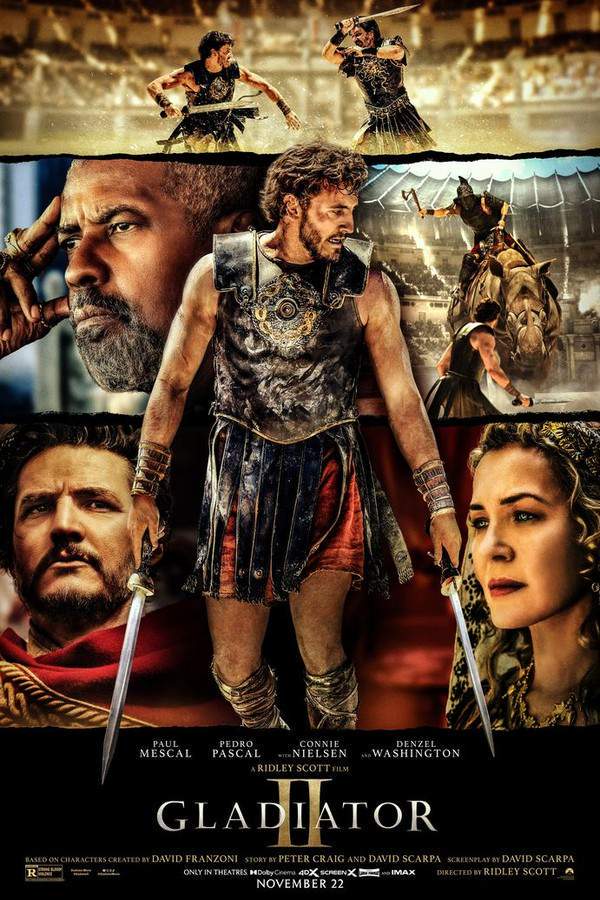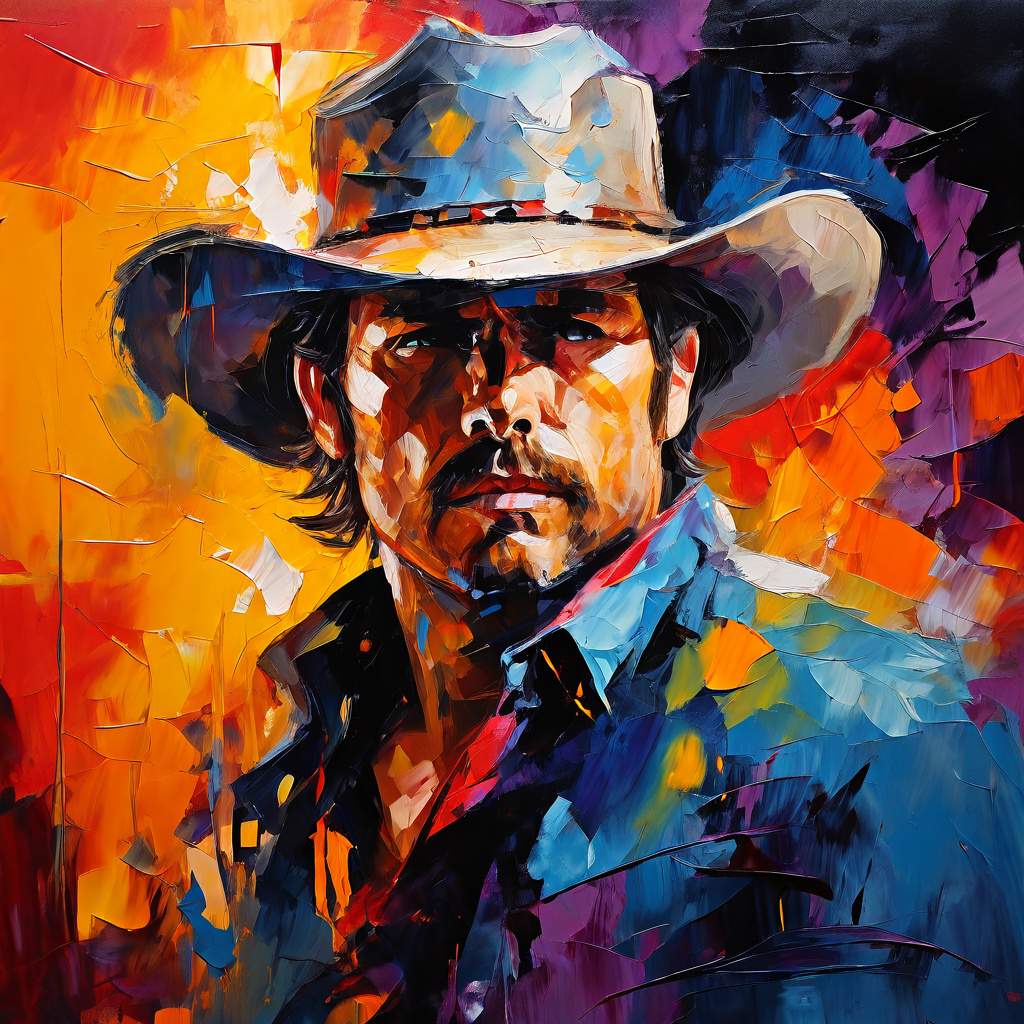What's After the Blog?
Reviews
Gladiator II (2024) Review: Does the Sequel Live Up to the Epic Original?
A closer look at Gladiator II’s ambitious storyline and thrilling action sequences. Does it honor the legacy of the original?
November 14, 2024

Movies mentioned in this article
Gladiator II (2024) Review: Does the Sequel Live Up to the Epic Original?
Nearly a quarter-century after Ridley Scott’s groundbreaking epic, Gladiator, the highly anticipated sequel, Gladiator II, has finally arrived. With a new protagonist and an ambitious storyline, the film seeks to recapture the magic of the original while carving out its own legacy. But does it succeed?
Introduction
When Ridley Scott’s Gladiator graced the silver screen in 2000, it wasn’t just a movie—it was a cultural phenomenon. The tale of Maximus Decimus Meridius, a Roman general turned gladiator seeking vengeance, captivated audiences worldwide and reinvigorated the historical epic genre. The film garnered five Academy Awards, including Best Picture, and left an indelible mark on cinema history.
Fast forward to 2024, and Scott invites us back into the brutal and mesmerizing world of ancient Rome with Gladiator II. This time, the story shifts to Lucius Verus, played by the talented Paul Mescal, as he navigates a Rome teetering on the brink of collapse. With a star-studded cast that includes Denzel Washington, Pedro Pascal, and the return of Connie Nielsen as Lucilla, the sequel aims to deliver both nostalgia and fresh perspectives.
Before we delve deeper, it’s worth noting that What’s After the Movie offers an extensive array of resources on Gladiator II. From in-depth movie summaries and quizzes to links to other reputable movie information providers, you can explore more about the film on our dedicated page: Gladiator II on What’s After the Movie.
Plot Overview
A New Hero Rises
Set 16 years after the death of Commodus and the events of the first film, Gladiator II centers on Lucius Verus, the son of Lucilla and nephew of the tyrannical Commodus. Exiled from Rome as a child for his safety, Lucius has grown into a formidable warrior in the African province of Numidia. Under the tutelage of local tribes and his own experiences, he has honed his skills, both in combat and leadership.
The Invasion of Numidia
Lucius’s peaceful life is shattered when the Roman legions, led by General Marcus Acacius (Pedro Pascal), invade Numidia under orders from the new emperors. The invasion is brutal and unprovoked, aiming to expand Rome’s dominion and suppress any potential threats. In the ensuing battle, Lucius’s wife—a fierce warrior herself—is killed, and Lucius is captured and sold into slavery.
Return to Rome
Brought back to Rome in chains, Lucius is thrust into the gladiatorial arenas that claimed the life of Maximus. Rome itself has changed dramatically. The empire is now ruled by the twin emperors Geta and Caracalla, portrayed with eerie charisma by Joseph Quinn and Fred Hechinger. Their reign is marked by decadence, cruelty, and a disregard for the welfare of the people.
The Path of the Gladiator
As a gladiator, Lucius becomes a symbol of hope for the oppressed masses and a pawn in the political games of the elite. He catches the eye of Macrinus (Denzel Washington), a former slave who has risen to become a wealthy and influential figure. Macrinus recognizes Lucius’s potential, not just as a fighter but as a means to his own ambitious ends.
A Quest for Redemption and Justice
Lucius grapples with his desire for vengeance against those who destroyed his life and his emerging role in the larger struggle for Rome’s soul. His journey becomes one of self-discovery, as he confronts his heritage, his loyalties, and the legacy of his possible father, Maximus.
Themes and Motifs
The Cyclical Nature of History
One of the film’s prevailing themes is the repetition of history. Lucius’s experiences echo those of Maximus—betrayal, loss, enslavement, and a rise within the gladiatorial ranks. This mirroring serves as a commentary on how societies often fail to learn from past mistakes, leading to recurring cycles of violence and corruption.
Power and Corruption
The twin emperors embody the dangers of absolute power without accountability. Their rule is marked by extravagance and tyranny, showcasing how leadership can become divorced from the needs and well-being of the people. The film delves into the corrupting influence of power and the moral decay it fosters within a society.
Identity and Legacy
Lucius’s struggle with his identity forms the emotional core of the film. Torn between his Numidian upbringing and his Roman heritage, he grapples with where his loyalties lie. The potential revelation of Maximus as his father adds another layer to his quest, as he seeks to understand and perhaps fulfill a legacy he never knew he had.
Redemption and Sacrifice
Throughout the film, characters are faced with choices that test their morals and convictions. Lucius, Macrinus, and even General Acacius must decide what they are willing to sacrifice for their beliefs and whether redemption is possible in a world rife with betrayal.
Character Analysis
Lucius Verus (Paul Mescal)
Paul Mescal delivers a compelling performance as Lucius, capturing the character’s internal conflicts and growth. Unlike Maximus, whose motivations were clear-cut revenge, Lucius’s journey is more complex. He is a man caught between worlds, seeking justice not just for himself but for the oppressed. Mescal brings a quiet intensity to the role, balancing physical prowess with emotional depth.
Macrinus (Denzel Washington)
Denzel Washington’s portrayal of Macrinus is a standout. As a former slave who has navigated the treacherous waters of Roman society to attain power, Macrinus is both mentor and manipulator. Washington infuses the character with charm and cunning, making him unpredictable and fascinating to watch. His relationship with Lucius is layered, oscillating between genuine mentorship and self-serving manipulation.
General Marcus Acacius (Pedro Pascal)
Pedro Pascal embodies the conflicted General Acacius with nuance. A respected military leader, Acacius is loyal to Rome but disillusioned with its leadership. His internal struggle adds complexity to the narrative, as he must choose between duty and conscience. Pascal’s performance conveys a man burdened by the weight of his actions and their consequences.
Lucilla (Connie Nielsen)
Reprising her role from the original film, Connie Nielsen brings gravitas to Lucilla. Now married to General Acacius, she remains a figure of strength and resilience. Lucilla’s efforts to protect her son and navigate the dangerous political landscape of Rome highlight her intelligence and fortitude.
The Twin Emperors: Geta and Caracalla
Joseph Quinn and Fred Hechinger deliver chilling performances as the twin emperors. Their portrayal of Geta and Caracalla is marked by decadence and madness. They serve as antagonists whose unchecked power and hedonism exacerbate Rome’s decline, making them formidable obstacles for Lucius and his allies.
Direction and Cinematography
Ridley Scott’s Mastery
At 86, Ridley Scott proves once again why he is a master of his craft. His direction in Gladiator II seamlessly blends epic scale with intimate character moments. Scott’s vision brings ancient Rome to life in all its glory and squalor, capturing both the grandeur of the empire and the brutality of its entertainment.
Visual Aesthetics
The film is a visual feast. The reconstruction of the Colosseum is awe-inspiring, built to scale and populated with thousands of extras to create an authentic atmosphere. The attention to detail extends to the costumes, sets, and props, immersing viewers in the period.
Cinematic Techniques
Cinematographer Dariusz Wolski employs dynamic camera work to enhance the storytelling. From sweeping aerial shots of Rome to tight, frenetic sequences in the arena, the cinematography heightens the emotional and physical stakes. The use of light and shadow adds a layer of symbolism, often reflecting the characters’ internal states.
Musical Score
Harry Gregson-Williams takes on the daunting task of composing the score, following in the footsteps of Hans Zimmer. The music pays homage to the original while introducing new themes that reflect the film’s evolved narrative. The score elevates key moments, from the tension of battle scenes to the poignancy of personal revelations.
Action and Battle Sequences
The Arena’s Brutal Spectacle
The gladiatorial combats are some of the film’s most exhilarating sequences. Ridley Scott ups the ante with innovative and intense battles that showcase the harsh realities of the arena. Highlights include:
- Exotic Beasts: Lucius faces off against fearsome creatures like man-eating baboons and a rampaging rhino, adding unpredictability and danger to the fights.
- Naval Reenactment: In a stunning set piece, the Colosseum is flooded to recreate a naval battle. Gladiators fight on boats as sharks circle beneath the surface, providing a visceral and suspenseful experience.
Choreography and Realism
The fight choreography emphasizes realism and brutality. Combat scenes are visceral, with bone-crunching impacts and strategic maneuvers. The use of practical effects and stunt work grounds the action, making it more impactful than CGI-laden sequences.
Thematic Significance
The battles are not mere spectacle; they serve as a microcosm of the larger conflicts within the empire. The arena becomes a stage where personal vendettas, political schemes, and societal tensions play out, adding layers of meaning to the violence.
Political Intrigue and Social Commentary
The Corruption of Power
The film delves deep into the machinations of Roman politics. The twin emperors’ misrule highlights how absolute power can lead to absolute corruption. Their indulgence in excess and disregard for the populace reflect the dangers of leadership detached from reality.
Macrinus’s Ambition
Macrinus embodies the theme of ambition unchecked by morality. His rise from slavery to a position of influence is a testament to his cunning, but his methods raise ethical questions. His character serves as a commentary on the corrupting nature of power and the compromises individuals make to achieve it.
Reflections on Modern Society
While set in ancient times, Gladiator II draws parallels to contemporary issues. The portrayal of a society distracted by spectacle while leadership fails resonates with modern audiences. The film invites viewers to consider the consequences of apathy and the importance of holding those in power accountable.
Critical Reception
Praise for Performances
Critics have lauded the cast’s performances, particularly:
- Paul Mescal for bringing depth and nuance to Lucius.
- Denzel Washington for his charismatic and layered portrayal of Macrinus.
- Joseph Quinn and Fred Hechinger for their unsettling depiction of the twin emperors.
Acclaim for Direction and Production
Reviewers have praised Ridley Scott’s ability to recapture the epic scale of the original while introducing fresh elements. The production design, cinematography, and score have also received positive remarks for their contributions to the film’s immersive experience.
Mixed Opinions
Some critics note that while the film is a worthy successor, it doesn’t quite reach the emotional heights of the original. The echoes of the first film’s plot points have been pointed out as both a strength and a weakness, depending on the viewer’s perspective.
Exploring More on What’s After the Movie
For fans eager to delve deeper into the world of Gladiator II, What’s After the Movie offers a comprehensive suite of resources:
- Movie Summary: A detailed breakdown of the film’s plot and themes.
- Quizzes: Test your knowledge of the film and its historical context.
- External Links: Access to other reputable movie information providers.
- Discussion Forums: Engage with other fans to discuss theories, favorite moments, and more.
Visit the dedicated page here: Gladiator II on What’s After the Movie
Additional Resources and Links
Enhance your understanding and appreciation of Gladiator II through these trusted sources:
- JustWatch: Find where to stream or purchase the film.
- Metacritic: Read aggregated critic reviews and scores.
- Rotten Tomatoes: Explore audience and critic ratings.
- TMDB: Access detailed cast and crew information.
- IMDb: Find user reviews, trivia, and more.
- Wikipedia: Learn about the film’s production history.
- Box Office Mojo: Track the film’s box office performance.
Conclusion
Gladiator II is a grand return to the epic storytelling that made the original a classic. While it treads familiar ground, the film expands on its predecessor’s themes and introduces new dimensions to the narrative. With strong performances, especially from Paul Mescal and Denzel Washington, and Ridley Scott’s masterful direction, the sequel stands as a worthy addition to the saga.
The film invites reflection on timeless issues—power, identity, legacy—that resonate as much today as they did in ancient times. It challenges viewers to consider the cycles of history and the roles individuals play in shaping the future.
For those who loved the original and for newcomers alike, Gladiator II offers a captivating journey filled with action, drama, and thought-provoking themes. It may not eclipse the shadow of Maximus, but it honors his legacy while forging its own path.
Are we not entertained? Indeed, we are.
This review is part of the What’s After the Movie Blog, your destination for in-depth analyses, reviews, and discussions on the latest films. Explore more content, including movie summaries, quizzes, and links to other movie information providers on our site. Join us as we continue to explore the stories that captivate us long after the credits roll.
Continue reading

What's After the Movie?
Not sure whether to stay after the credits? Find out!
Explore Our Movie Platform
New Movie Releases (2025)
Famous Movie Actors
Top Film Production Studios
Movie Plot Summaries & Endings
Major Movie Awards & Winners
Best Concert Films & Music Documentaries
Movie Collections and Curated Lists
© 2025 What's After the Movie. All rights reserved.








